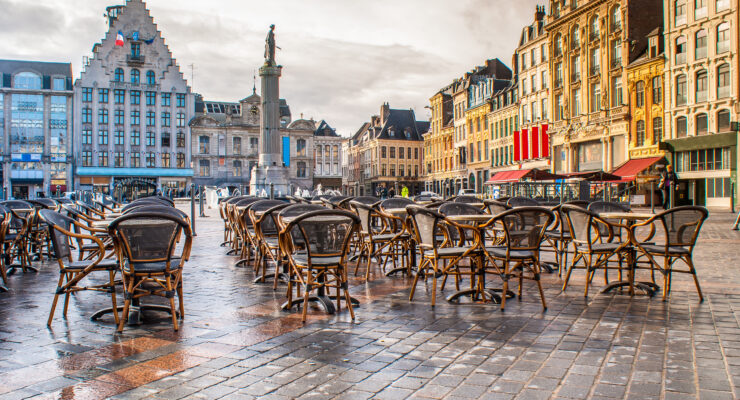Brasseries are known to serve traditional French fare and alcohol. Easily recognizable by their outdoor seating under red canvas awnings, they are kind of the French version of a classic diner. Popular dishes include burgers, steak and fries, and croque monsieur (grilled cheese sandwich).
Making a reservation
The easiest way to make a reservation is through an app called TheFork. Many restaurants are on the platform and it is easy to filter by cuisine, location, and availability. There are even restaurants that run promotions of 10-50% off the à la carte menu.
This app used to be called LaFourchette, so you may still hear people refer to its French name.
If a restaurant doesn’t take online reservations, then you may want to call directly. If doing so in French seems intimidating, remember that there are really only a few key phrases to have ready.
1. The greeting
- E.g., Bonjour, j’aimerais faire une réservation s’il vous plaît.
2. Date and time
- E.g., Le 29 janvier à 19 heures (France does not use am/pm)
- All dates are read as regular cardinal numbers (not ordinal numbers like in English), with the exception of the first day of the month, which is le premier. So for example, February 1st would be le premier février.
3. Size of party
4. Your name
- They may ask for your nom (name or family name). Be ready to spell it out and know how each letter is pronounced in French. Or just pick a standard French name that they are sure to know the spelling of.
5. Phone number
- If needed, jot down how your phone number is said in French. In France, phone numbers are written as pairs of digits (e.g., 12-34-56-78-90) and read as five numbers (e.g., twelve, thirty-four etc). But if it is easier for you to simply dictate ten digits, they will understand too.
There shouldn’t be any surprise questions. For this reason, calling for reservations is one of the best ways to get comfortable with making calls in French.
If you’re making dinner plans with French people, don’t schedule earlier than 7pm. Most people eat at 8pm or later, and many restaurants don’t even open until 7pm.
Showing up to a restaurant
If you have a reservation, simply inform the waiter by evoking your name. “Bonjour, j’ai une réservation au nom de [name]”.
If you don’t have a reservation, you can ask if they have any seats available for your party. “Bonjour, vous avez une table pour [number] personnes ?”
You may be asked two questions:
1. Whether you’re looking to eat or just drink. Pour manger ou pour boire?
- Eat: Pour manger s’il vous plaît.
- Drink: Pour boire s’il vous plaît.
2. Whether you’d prefer indoor or outdoor seating. À l’intérieur ou en terrasse?
- Inside: À l’intérieur s’il vous plaît.
- Outside: En terrasse s’il vous plaît.
Decide with your group beforehand to avoid being caught off guard.
It is common for patrons seated outside to smoke cigarettes. So if you or another guest is sensitive to smoke, sit inside.
Reading the menu
Like elsewhere, in France it is common for waiters to take orders for drinks first so you may want to read the boissons menu first. One unfamiliar acronym you might see is cl. This is short for centilitre, and one centilitre is equivalent to 10 millilitres (ml). So for example, a 750ml bottle of water would become 75cl.
As for the food menu, some important words to know include the following:
- Entrée = Appetizer
- Plat = Main course
- …du jour = …of the day
- Maison = House, homemade
- Formules = Combos, sets
You can also ask if they have an English menu by saying Vous avez un menu en anglais s’il vous plaît?
Placing your order
A few moments later, the waiter will come around to take your orders. You can reply with:
- Oui, on est prêts. We are ready.
- Encore quelques minutes s’il vous plaît. A few more minutes please.
To order like a local, confidently say Alors, je vais prendre… et… s’il vous plaît (So, I will have… and… please).
Once everyone has ordered, ask for une carafe d’eau to get a refreshing pitcher of tap water. If you just ask for water without using this very specific and common phrase, be prepared for the possibility of being charged for a glass bottle of glacial water.
Bon appétit!
Enjoying the meal
If you ordered an appetizer, the waiter will wait until you finish before bringing out the main course.
Restaurants in France prioritize discretion in their service. Your waiter will not be coming around every few minutes asking if everything is alright. Many foreigners interpret this as rudeness or coldness, but French patrons just don’t appreciate being interrupted when they haven’t asked for anything. If you do need help, signal to a waiter with excusez-moi.
Once everyone finishes their main course, the waiter will bring the dessert menus. It is also common for the French to drink a small coffee instead of having a dessert (or both).
Paying the bill
Ask for the bill by saying L’addition s’il vous plaît. If the party prefers to split the bill, that is a normal and acceptable request to make: On va diviser par [number] s’il vous plaît. Tipping is not necessary.
Heading out
Take your time to continue sitting and chatting with your party. French waiters don’t pressure patrons to leave after eating and paying. This is one thing that I really appreciate about living in Paris.
If there is anyone greeting you on your way out, wrap it all up like a pro by saying thank you and good bye: Merci au revoir. Then, take the métro home and fall into a food coma because dinner started at 8pm and now it’s 11pm – sorry, 23h.












 Français
Français English
English




0 comments
{{like.username}}
Loading...
Load more